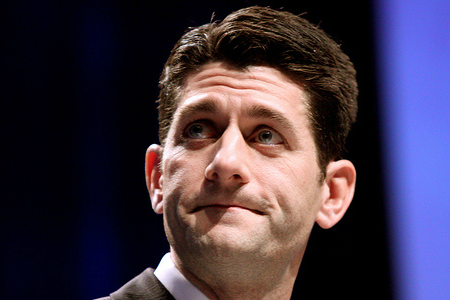Yesterday, the Boston Globe had a big scoop. Rep. Paul Ryan (R-Wis.) — the Republican vice presidential candidate and vocal foe of government spending — sought millions in stimulus funding for Wisconsin organizations working on energy conservation.
In 2009, as Rep. Paul D. Ryan was railing against President Obama’s $787 billion stimulus package as a “wasteful spending spree,” he wrote at least four letters to Obama’s secretary of energy asking that millions of dollars from the program be granted to a pair of Wisconsin conservation groups, according to documents obtained by the Globe.
The advocacy appeared to pay off; both groups were awarded the economic recovery funds — one receiving a $20 million grant to help thousands of local businesses and homes improve their energy efficiency, agency documents show.
As the Globe notes, this advocacy runs directly counter to the rhetoric Ryan employed on the floor of the House. During debate on January 27, 2009, Ryan explained his opposition to the stimulus bill.
Mr. Chairman, we can do better than this. We’re losing tens of thousands of jobs a week in this economy. This is the worst recession we’ve seen in generations. And what are we about to vote on? We are about to vote on a trillion dollar spending package — yes, a trillion dollars, because the Congressional Budget Office just told us today just to pay for the interest on this bill is another $350 billion. We’re going to vote on a trillion dollar spending package that amounts to basically a spending wish list for all the special interest groups out there. …
[W]e need to come together with an economic rescue package that actually helps the economy. This bill is not worthy of our new President’s signature. We can do better than this. This is not something that should come to the floor.
Ryan specifically targeted clean energy for critique during debate on a separate bill, the American Clean Energy and Security Act, in June of 2009.
Mr. Speaker, this bill is not about science, it’s not about costs and benefits; it’s about ideology. Because if you look at the costs and benefits, the goal of this bill is to reduce global warming by 2/10 of a degree over a hundred years, hit our economy with this massive tax increase on homeowners, on people buying gasoline, heating their homes, hit manufacturing at a time when our competitors will not do this. This bill will result in jobs leaving the Midwest and jobs leaving America and going to other countries. …
This unilateral big government, Big Brother bill is not good for the planet. It’s not good for our economy. And it sure as heck is not good for the Midwest. And I encourage my colleagues not to vote ideology, vote your districts and your constituents.
But behind the scenes, Ryan seemed quite convinced that stimulus spending — clean-energy spending specifically — could bring jobs to the Midwest.
In a letter sent to Labor Secretary Hilda Solis in October 2009, he argues that the Energy Center of Wisconsin (ECW) should receive stimulus-bill funding so that it and its partners can “develop an industry-driven training and placement agenda that intends to place 1,000 workers in green jobs.”
[protected-iframe id=”c3e734e8982a7e73a17a4eee9773ffed-5104299-36375464″ info=”http://www.scribd.com/embeds/102957773/content?start_page=1&view_mode=scroll&access_key=key-1pw911llme0xqm9x5yac” width=”400″ height=”400″ frameborder=”0″ scrolling=”no”]
ECW did not get that grant, but the group got two others for which Ryan had pressed, for geothermal research and job training at a Milwaukee community college. The Globe also outlines Ryan’s appeals to the Department of Energy on behalf of Wisconsin Energy Conservation Corporation (WECC), which received a stimulus grant of $20 million for energy-efficiency work. (It’s worth noting that neither of these organizations is a small, mom-and-pop green shop. ECW had nearly $8 million in income during its last fiscal year; its board includes representatives from many of Wisconsin’s electricity and utility organizations. WECC is far larger — $144 million in income in the 2010-2011 year, with $90,000 spent on lobbying.)
As if pushing for government funding for green jobs weren’t bad enough, in his letter to Solis, Ryan calls out a partnership with organized labor. As The New Republic noted on Sunday, Ryan has a friendly relationship with building trade unions, in part because of the family business for which he used to work.
Paul Ryan’s family business was involved in construction of GenPower’s Longview coal-fired plant near Maidsville, W.Va.
Ryan Incorporated Central, founded by Ryan’s great-grandfather, works on a variety of construction projects, including landfill creation and ancillary construction on new coal- and gas-fired power plants. It’s not clear if Ryan has any stake in the family company — his personal financial statements indicate holdings in two unnamed LLPs — but he certainly has a financial stake in the fossil-fuel industry otherwise, owning various mineral rights and leases to oil companies. (Perhaps not coincidentally, Ryan is a favorite with the fossil-fuel-loving Kochs.)
Say this for Ryan: He pushed energy-efficiency projects even though they might have gone against the interests of his family’s business and his own portfolio.
Ryan’s spokesperson hasn’t responded to the newly publicized letters, instead pointing to a statement his office gave the Wall Street Journal in 2010:
If Congressman Ryan is asked to help a Wisconsin entity applying for existing federal grant funds, he does not believe flawed policy should get in the way of doing his job.
Ryan’s actions on behalf of his constituents were hypocritical — both in terms of his speeches on the floor of the House and in terms of his personal beliefs — but they were the right things to do. His job is to help his constituents, even if that help comes via energy-conservation groups.
The advocacy is what he should have been doing. The proselytizing isn’t.




